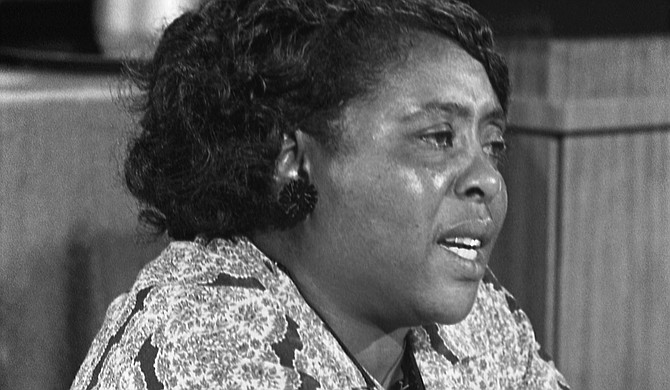JACKSON, Miss. (AP) — Mississippi-born civil rights activist Fannie Lou Hamer is being commemorated Friday on what would have been her 100th birthday.
Community gatherings are being held in her hometown of Ruleville, where a larger-than-life statue of her was dedicated in a memorial garden several years ago. The small city in Sunflower County is about 110 miles (180 km) north of Jackson.
Hamer — who was 59 when she died of cancer in 1977 — was famous for saying she was "sick and tired of being sick and tired" of the abuse that African-Americans suffered in the segregated South.
She was fired from the plantation where she worked as a sharecropper in 1962 because she and a few other black Mississippians registered to vote.
Flonzie BrownWright was a young civil rights activist in 1964 when she met Hamer, who was a generation older and was known for advocating equal rights even when doing so put her own life in peril.
In 1964, Hamer was part of the integrated Mississippi Freedom Democratic Party group that challenged seating of the all-white Mississippi delegation at the Democratic National Convention in Atlantic City, New Jersey.
"Because of her thunderous voice and the passion in her eyes, she was chosen to speak before the credentialing committee," BrownWright, who was an aide to another prominent Freedom Democrat, said Thursday.
In a televised appearance that drew international attention, Hamer told the committee that she and other black women were returning from citizenship training in the South Carolina in 1963 when they were pulled off a bus in Winona, Mississippi, and taken into a jail. She said a white highway patrolman told her, "'We are going to make you wish you was dead,'" and then white officers ordered black inmates to beat her.
"All of this is on account of we want to register, to become first-class citizens," Hamer said. "And if the Freedom Democratic Party is not seated now, I question America. Is this America, the land of the free and the home of the brave, where we have to sleep with our telephones off the hooks because our lives be threatened daily, because we want to live as decent human beings, in America?"
Other white delegations from the South threatened to leave if the regular Mississippi delegation was unseated. Freedom Democrats rejected what they considered an inadequate offer of two nonvoting seats at the convention.
Hamer and other activists spent the next several years working to register black voters amid changes facilitated by the Civil Rights Act of 1964, which outlawed segregation in public places and discrimination in employment practices, and the Voting Rights Act of 1965, which outlawed practices that massively disenfranchised black citizens.
Mississippi sent integrated delegations to later Democratic conventions. BrownWright said she sees a direct connection between the work done by Hamer and other Freedom Democrats and the election of Barack Obama in 2008 as the first black president of the United States.
Some in the Mississippi Delta remember Hamer for practical ways she helped improve their lives.
Carl Watson, a 58-year-old Ruleville resident, was the second-youngest of 11 children and said that until he was 12 years old, his family lived on a cotton farm in two shacks — one for his mother and the girls and one for his father and the boys. In about 1972, Hamer and her husband, Perry "Pap" Hamer, helped the Watsons find a better home in Ruleville.
Carl Watson said it was the first time his family had a house with running water and indoor plumbing: "We moved to heaven."



Comments
Use the comment form below to begin a discussion about this content.